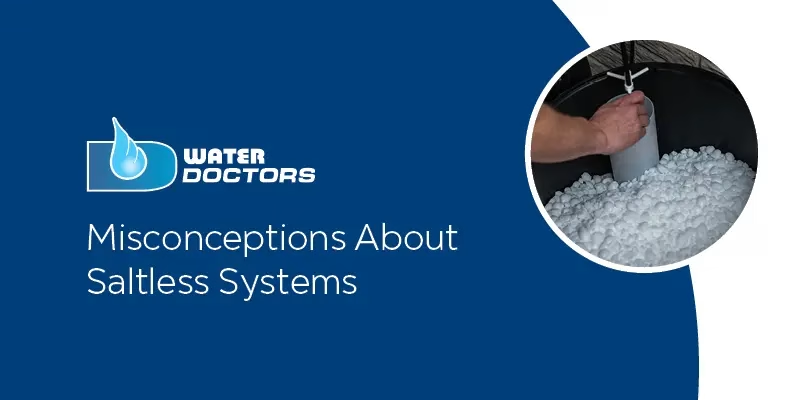Make an Informed Decision About What’s Right for Your Home
Recently, several municipalities in Southeast Wisconsin have encouraged homeowners to switch to saltless systems for their water. And while these systems might seem intriguing, homeowners need to understand a few key factors before making the switch. What exactly are saltless systems? Do they work effectively for Wisconsin homes? Water Doctors is here to provide you with answers.
What is a Saltless Water System?
First, it’s important to clarify that a saltless system isn’t actually a water softener. Instead, it’s better described as a water descaler. This equipment, initially developed for the Asian market, aims to reduce calcium buildup by conditioning water, not removing hardness.
Saltless systems condition calcium using either a coating or absorption method. Most systems form a crystalline structure around calcium, allowing it to pass through plumbing without sticking. However, conditioned water won’t behave like soft water, won’t feel soft, and won’t provide the traditional benefits associated with softened water.
Are Saltless Water Systems Effective for Wisconsin’s Hard Water?
While saltless systems may seem appealing due to their initial lower cost and environmental claims, they typically struggle with Wisconsin’s notoriously hard water. Areas like Menomonee Falls, Madison, and West Bend frequently experience hardness levels exceeding 20 grains per gallon, significantly reducing the efficiency and lifespan of saltless systems.
Understanding the Cost of Saltless Water Systems
Saltless systems often attract homeowners because of their lower initial price. However, long-term investment costs can add up quickly. Originally designed for areas near oceans with a hardness of only 3-4 grains per gallon, current saltless systems generally handle up to around 15 grains. But even near Lake Michigan, where water averages around 8-9 grains per gallon, these systems require frequent maintenance.
In Southeast Wisconsin, some areas surpass 22 grains per gallon, which can rapidly degrade saltless systems. This means regular rebedding or filter replacements. Rebedding can cost hundreds of dollars each time, quickly increasing your investment. In places using Lake Michigan water, homeowners might need rebedding every 18 months, while areas with harder water may require rebedding every few months.
Why Do Saltless Water Systems Struggle in Wisconsin?
Saltless systems simply don’t have the capacity to handle the extremely hard water in our region. While they condition water temporarily, the persistent hardness quickly overwhelms the systems, increasing maintenance frequency and cost.
Why Water Doctors Recommends Traditional Water Softeners
Water Doctors recommends homeowners in Southeast Wisconsin use traditional water softeners instead of saltless systems. Water softeners remove calcium from water completely, giving you genuine soft water. Benefits include longer appliance lifespans, softer skin, shinier hair, and savings on cleaning products.
At Water Doctors, we offer both non-electric twin tank water softeners and traditional electric water softeners from Kinetico. While these systems may cost more upfront, they typically last 15-20 years or more, providing better value over time. With our affordable Aqua Care Club, you can also enjoy routine maintenance for continuous optimal performance.
If you have other questions about saltless systems or water softeners, just ask! We’re happy to address any concerns you might have. Contact Water Doctors Today
nvest in Cleaner, Safer Water for Your Wisconsin Home
While saltless systems are gaining attention, they’re not a one-size-fits-all solution, and they rarely suffice for Wisconsin’s water hardness levels. When comparing saltless systems with traditional softeners, always consider ongoing maintenance costs and their capacity to handle local water conditions.
For more information on water quality standards, visit the Water Quality Association (WQA). To explore our trusted Kinetico water softener options, check out our Water Softeners page.
Schedule a free water test to discover the solution that works best for your home.
